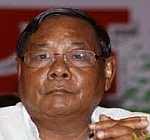 The Supreme Court on Wednesday reserved its verdict for December 5 as to whether the plea of former Lok Sabha Speaker P A Sangma, challenging the election of Pranab Mukherjee as president, deserves a "regular hearing" or not.
The Supreme Court on Wednesday reserved its verdict for December 5 as to whether the plea of former Lok Sabha Speaker P A Sangma, challenging the election of Pranab Mukherjee as president, deserves a "regular hearing" or not."Arguments concluded. We shall pass the order on December 5," a five-judge bench headed by Chief Justice Altamas Kabir said after Ram Jethmalani, counsel for Sangma, wrapped up arguments with the claim that the plea deserved a regular hearing as it affects the "whole nation" because the person who became president would be custodian of the Constitution for next five years.
In the day-long arguments also by Mukherjee's lawyer Harish Salve and Attorney General G E Vahanvati, Jethmalani said the court was required to see as to whether the petition raised any cause of action or not.
"The plea that whether Mukherjee held office of profit or not can only be ascertained by examining witnesses and documents and hence, the petition deserves a regular hearing," he contended.
Earlier, the AG opposed the plea of Sangma on the issue of office of profit.
"An office of profit is an office which must be under the government, which enjoys the power to appoint and remove and some salary or emoluments must be attached to the post," Vahanvati said, adding that this was not the case with the post of the chairperson of the Indian Statistical Institute.
"No pecuniary benefits were attached to the post of chairman of the ISI. Moreover, the post must be such where the office-bearers can be influenced by the appointing authority," the law officer, who is assisting the court, said.
Earlier, Salve during his arguments before the bench, also comprising justices P Sathasivam, S S Nijjar, J Chelameswar and Ranjan Gogoi, said the petition was frivolous and a fit case to be dismissed.
"Mukherjee was the leader of the Congress party in the Lok Sabha and this can never be an office of profit under the government," he said.
Salve also said he can request for minutes of the meeting from the Congress Working Committee, which held a special farewell for Mukherjee, then poised to become the president.
"On June 25, the CWC held a farewell. It is absurd that he held the office of profit till June 30," he said.
Contesting this Jethmalani said, "The farewell can be held in anticipation also."
He opposed the plea of Salve that the provisions of the Civil Procedure Code have no role in deciding petitions, which challenge the elections of the president and the vice president.
The rules, which provide for screening of such pleas, were brought about by the apex court to "discourage" frivolous petitions, he said, adding that Sangma's petition has shown a "cause of action" and hence, deserved a regular hearing.
Dealing with the post of the chairman of ISI, Jethmalani said, "For all practical purposes, the office of ISI is subordinate to the central government."
The ISI is financed by the government and the auditing methods, applicable to public bodies, are applicable on it also, he said, adding that Mukherjee's resignation from the ISI was not valid.
Jethmalani said, "You cannot simply walk out by resigning. This is a statutory office."
The post of the chairman at the ISI has a fixed tenure of two years and one can demit office by absenting himself from three successive meetings of it, he said.
Resigning from the post of chairman is "a bilateral and not an unilateral act," he said.
Earlier, Salve rejected the plea of Sangma that Mukherjee was holding an office of profit on the day of filing his nomination for the president's election on June 28, saying he ceased to be the leader of the Lower House as a result of his resignation from the Union Cabinet.
In his petition, Sangma had said that the veteran Congress leader was not eligible for the post as he was holding offices on the day he filed his nomination.
Earlier, the court had taken on record the short affidavit of Mukherjee, who said the grounds for challenging his election was "ex facie misconceived."
Sangma has contended that Mukherjee was holding offices of profit as chairman of the ISI, Kolkata and as also the leader of the Congress in the Lok Sabha when he had entered the presidential race.










 © 2025
© 2025